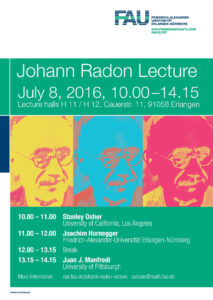Johann Radon Lecture 2016
 Johann Radon Lecture
Johann Radon Lecture
July 8, 2016
Felix Klein Building, lecture hall H11 and Emmy Noether lecture hall H12
Cauerstr. 11, 91058 Erlangen, Germany
The Faculty of Sciences invites all interested people cordially to the Johann Radon Lecture at the University of Erlangen-Nürnberg, Germany.
Prof. Dr. Radon (1887 – 1956) was professor of Mathematics in Erlangen from 1925 – 1928.
Radon is known for a number of lasting contributions, e. g. the Radon transform in integral geometry, based on integration over hyperplanes with application to tomography for scanners.
Programme:
| 10.00 – 11.00
Lecture Hall H 11 |
Prof. Stanley Osher PhDProfessor of Mathematics, University of California, Los Angeles Title: Overcoming the curse of dimensionality for certain Hamilton-Jacobi (HJ) equations arising in control theory and elsewhereAbstract: It is well known that certain HJ PDE’s play an important role in analyzing continuous dynamic games and control theory problems. The cost of standard algorithms, and, in fact all PDE grid based approsimations is exponential in the space dimension and time, with huge memory requirements. Here we propose and test methods for solving a large class of HJ PDE relevant to optimal control without the use of grids or numerical approximations. Rather we use rhe classical Hopf formulas for solving initial value problems for HJ PDE. We have noticed that if the Hamiltonian is convex and positively homogeneous of degree one that very fast methods (related to those used in compressed sensing) exist to solve the resulting optimization problem. We seem to obtain methods which are polynomial in dimension. We can evaluate the solution in very high dimensions in between 10^(-4) and 10^(-8) seconds per evaluation on a laptop. The method requires very limited memory and is almost perfectly parallelizable. In addition, as a step often needed in this procedure, we have developed a new and equally fast and efficient method to find, in very high dimensions, the projection of a point exterior to a compact set A onto A. We can also compute the distance to such sets much faster than fast marching or fast sweeping algorithms. The term “curse of dimensionality” was coined by Richard Bellman in 1957 when he did his pioneering work on dynamic optimization. |
| 11.00 – 12.00
Lecture H 11 |
Prof. Dr.-Ing. Joachim HorneggerFAU President Title: Radon Transform and its Role in Modern Medical ImagingThe discovery of x-ray and the characterization of x-ray attenuation by Radon transform are the foundation for computed tomography (CT) algorithms. Standard reconstruction algorithms require rigid objects. In medical settings, however, patients move. For instance, they breath, swallow and the heart beats. The development and design of algorithms for motion compensated reconstruction are a major challenge and mandatory for many clinical applications of CT imaging. In this talk I will give an overview of recent advancements of motion detection, motion estimation and motion compensation in CT. Finally the developed motion compensation methodology is transferred to optical coherence tomography, where the novel class of algorithms found their way to commercial product software. |
| 12.00 – 13.15 | Break |
| 13.15 – 14.15
Emmy Noether Lecture Hall |
Prof. Juan J. Manfredi PhDVice Provost for Undergraduate Studies, University of Pittsburgh Title: OBSTACLE PROBLEMS FOR THE P-LAPLACIAN VIA TUG-OF-WAR GAMESAbstract: We present a stochastic approach to the single and double obstacle problems for the p-Laplacian operator, where 2 ≤ p ≤ ∞. Solutions are uniform limits of solutions to discrete min-max problems that can be interpreted as satisfying the dynamic programming principle for appropriate tug-of-war games with noise. In these games, both players in addition to choosing their strategies, are also allowed to choose stopping times. The solutions to the double-obstacle problems are limits of values of these games, when the step-size controlling the single shift in the token’s position, converges to 0. This is joint work with Marta Lewicka and Luca Codenotti (Pittsburgh) |
Entrance free.
More information: calcvar@math.fau.de
Downloads:
Programme Johann Radon Lecture